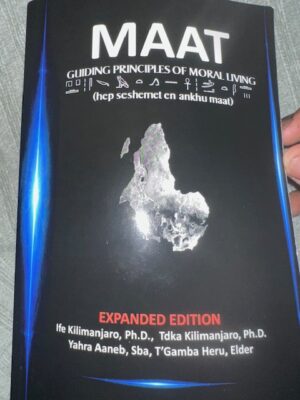-
I recently finished reading “Maat: Guiding Principles of Moral Living” by Nana Tdka, Ifa Kilamanjaro, and others, and I have to thank whoever recommended it on Abibitumi. I found the insights on various Kemetic teachings incredibly valuable. The authors’ approach reminds me of Nana Karenga’s Kawaida philosophy, which emphasizes drawing from the best of African wisdom to apply it meaningfully in today’s world. The authors articulate beautifully what it means to embrace an African identity in the modern era:
“We are obligated to professionally organize our misery, our suffering, our enslavement, and our exploitation, not merely to end this miserable condition, but to create a world anew, to give new meaning to our lives, to give freedom to our souls again, to have faith in our own abilities again, to live in love again beyond the pain, to feel life beyond the storms, to live again without prisoners and slaves, to think without censors, to believe without fear of devils and gods, to hope, without handouts and humiliation, to stand without bending, to walk without crawling, to speak without stuttering, to have courage again, to have heart, to ensure safety against attacks, to be without want and weakness, to be whole again, to do justice and to be just, to reach for perfection again.”
What I found interesting in the book is that there was little mention of the Creator. Although there were some references to Kemetic divinities, there wasn’t much discussion about the Supreme Being or divinities. The book gives off a human-centered tone, emphasizing what can be observed and verified in the world. Since the Ancestors were real people who lived and left a tangible legacy, the authors seem to prioritize their influence. I’m interested to know if others felt this way. Regarding divinities, the authors state:
“In the progressive element of ancient Kmtic thought, each organic life form had a motive force, an internal driving force, a will. That will was manifested in real-life deeds that developed in sequence, not invoking powerless, abstract spirits that could not stop one white man-made bullet from piercing the skull of one innocent African child.”
And further:
“The guiding principles do not direct people to seek salvation or answers in anything or anyone other than themselves; we know that both lay within us. We do not speak to the existence of God or gods because the important work of transforming oneself and ultimately the world rests in the hands of those willing to carry that work out. Whether or not we believe in a God or gods is immaterial; it is not important. What is important is living a life of purpose and integrity, one that allows us to know that in the end, when our lives have run their course and our hearts have been weighed against a feather, we have been found worthy to stand in the company of great ancestors—the best of those who measured up in an earlier life. This is judgment: life lived fully in truth, justice, fairness, balance, reciprocity, and accountability in this world.”
In this view, it’s your actions, decisions, and efforts in life that matter most, not whether you rely on “abstract” or “distant” spirits for help. These passages points out that in this philosophical view, calling upon spirits with no connection to real-world action is ineffective. For instance, I can’t expect a deity to help me pass an exam if I do not study.
However, what I do believe if I’m burning the midnight oil and get tired and I say, “Onyame boa me” its is my understanding that since I’m doing the work, the Creator will give me that extra boost to keep trudging along.
Overall, it’s an intriguing book with valuable lessons. I’d make a few adjustments to some practices, such as the declarations. Personally, I think it would be more impactful to translate these declarations into an African language and recite them while pouring libations, invoking the Supreme Being, deities, and other spiritual forces.
 Kala Kambon, Tayo Adamolekun and 4 others9 Comments
Kala Kambon, Tayo Adamolekun and 4 others9 Comments-
It’s a great book. I’ve recommended it a number of times here on Abibitumi
 1
1-
@BakaOmubo @Tenkamenin
I would like to get my hands on the book.
Where did you get it? 1
1-
@Kwabena https://universityofkmt.myshopify.com/
I’m going to get more of his books.
-
@Tenkamenin
Medaase.
I will definitely check it out and order one for myself myself.
Again, medaase. -
@Tenkamenin I have several of his books. I’m currently reading The Art of Leadership by him & sbA Mkuu Mzee
-
-
-
@Baka I listened to his interview on YouTube about it. I’m going to get that and his book on organization, I’m wondering if it has an African centered perspective on running organizations.
-
@Tenkamenin
@Baka has posted several of his videos on AbibitumiTV. I found it very informative, intellectual, helpful and engaging. -
@Tenkamenin He does maintain an Afrikan-Centred perspective on running organisations.
-
@Baka say less, I just bought 4 of his books right now.
Thinking about it, you were probably the one that put me on his book Maat.
 1
1
-
-
-
-



